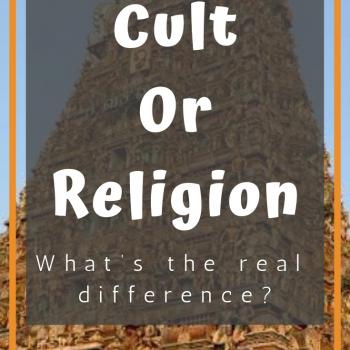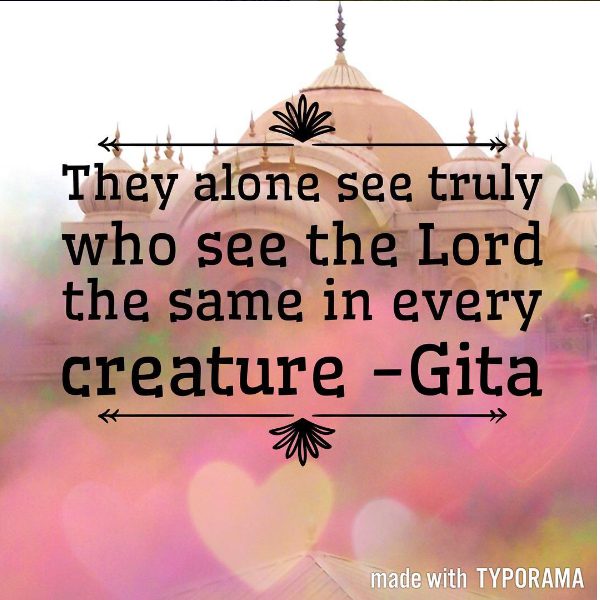Recently I had a much more productive conversation with my half-Indian coworker than before. It was a slow, quiet Friday afternoon. There were only three people in the office and he happened to be working on a project right next to me.
I don’t remember how we started but we were soon talking about the differences between Americans and Indians. Particularly around politics and “corruption.” He has a fascinating theory that bribery and corruption create a bond of trust between the common man and authority that we lack in America. I can’t speak for him, but it seemed that he sees Americans as woefully legalistic and unable to understand the importance of shades of gray.
At some point we were briefly talking about religion also. He is an atheist, though from a Hindu family. He reminisced about performing the rituals by rote. I said that it’s important to me to not just repeat rituals through memorization but to understand the whys behind what we do.
“That’s such an American way to look at it,” he said, but then backpedaled a bit as he realized that statement could be potentially insulting (to a supposed-Indian-wannabe like me, right?)
And I did feel a little sting.
Then I wondered why. I am American. Of course I bring my American perspective to my practice of Hinduism. (Though his explanation suddenly made it more clear why pandits seem to rush through Sanskrit at break-neck speeds. It’s not necessarily important for us to understand what they are saying, the things just need to be said).
So where is the insult? I think for many liberal Americans we don’t like our viewpoint reduced to “that’s so American” because we like to see ourselves as more worldly, cosmopolitan, knowledgeable. We like to show off how much we know about other cultures and compete with how much we can respect the hec out of those other cultures!
This is where we liberal Americans get in trouble for not taking enough pride in our heritage. Conservative Americans will say that we are not patriotic enough and therefore not “real” Americans, while we worry that being identified too strongly as American means that we are less knowledgeable and empathetic to people in other countries. When a fellow American complains to The Gap about having a Muslim model (who is actually Sikh), we pride ourselves on being smarter than that, knowing the difference, knowing also that Muslim models would be a good thing. We don’t want to be associated with that ignorance and so distance ourselves from being labeled what we are: American.
We want to be more than a stereotype of Americans who can’t see past their own noses.
Yet too often that pride masks from ourselves the ignorance that we do still have. I’ve said before, none of us are without biases and my point of view is an American one.
There was an unintended subtle insult to my post about Hindu hospitality and how it differs from the American culture of making plans and not just dropping in. For some people, there is an insult in saying that if you like to know your plans ahead of time, you’re so American and perhaps implied to be not spiritual or hospitable.
Perhaps we have internalized the outsiders view of us as materialistic, self important, vain, and Godless. So much time spent trying to prove that we know about the world and what we take away from it is the world’s view of ourselves and then we become desperate to prove that that’s not us. Maybe looking for identity anywhere but where we grew.
Saying that my perspective was American was also a way of saying that it was tainted by Christianity. He made the argument that in older religions you do things because God told you to. Not because you have a personal connection or need to understand why. Christians brought those ideas with them. (Maybe that’s where the insult really lies for me. Being connected in any way to Christianity is very upsetting to me).
I think, though, in Hinduism there is another reason we do things by rote. From what I have learned of world religions it seems to me that Judaism and Islam have a strong connection to we do these things because God asked us to and we love and respect God, so we do it. In Hinduism I think the reason we say and do certain things has more to do with the alignment within the body. We chant in Sanskrit to create certain vibrations within us. We perform rituals and movements in certain ways because they spiritually align us (and I believe that’s where the practice of Hatha Yoga comes from).
So is it a bad thing that I bring an American point of view to my religious life? I don’t think so.
I am what I am. I am an American and so that’s always the perspective I’m going to bring to my life.
Am I an Indian-wannabe? I don’t see myself that way. Okay, there are times where it feels like my life would be a lot easier if my skin were brown (irony, much?). But I’ve always believed that there are valuable things in both Indian culture and American culture and that it’s good to seek out the best in each to bring to my spiritual practice.
I’m not Indian. I am American. But I am also Hindu. There are plenty of us American Hindus, of all ethnicities including Indian. We might have a new way to look at ancient practices and maybe that new light can help all of us Hindus see more clearly.
So I will not be ashamed. If wanting to understand the rituals that I’m performing makes me American, then so be it. Because I do like to understand the rituals I participate in. (Now, whether that actually is an “American” way to look at it, I’m not sure. )
















